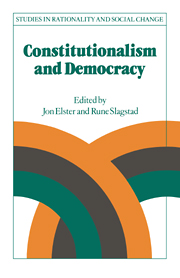Book contents
- Frontmatter
- Contents
- Notes on contributors
- Introduction
- 1 Gag rules or the politics of omission
- 3 Democracy as a contingent outcome of conflicts
- 3 Consequences of constitutional choice: reflections on Tocqueville
- 4 Liberal constitutionalism and its critics: Carl Schmitt and Max Weber
- 5 Democracy and the rule of law: some historical experiences of contradictions in the striving for good government
- 6 Neo-federalism?
- 7 Precommitment and the paradox of democracy
- 8 American constitutionalism and the paradox of private property
- 9 From liberal constitutionalism to corporate pluralism: the conflict over the enabling acts in Norway after the Second World War and the subsequent constitutional development
- 10 Arguments for constitutional choice: reflections on the transition to socialism
- 11 Constitutions and democracies: an epilogue
- Index
11 - Constitutions and democracies: an epilogue
Published online by Cambridge University Press: 05 June 2012
- Frontmatter
- Contents
- Notes on contributors
- Introduction
- 1 Gag rules or the politics of omission
- 3 Democracy as a contingent outcome of conflicts
- 3 Consequences of constitutional choice: reflections on Tocqueville
- 4 Liberal constitutionalism and its critics: Carl Schmitt and Max Weber
- 5 Democracy and the rule of law: some historical experiences of contradictions in the striving for good government
- 6 Neo-federalism?
- 7 Precommitment and the paradox of democracy
- 8 American constitutionalism and the paradox of private property
- 9 From liberal constitutionalism to corporate pluralism: the conflict over the enabling acts in Norway after the Second World War and the subsequent constitutional development
- 10 Arguments for constitutional choice: reflections on the transition to socialism
- 11 Constitutions and democracies: an epilogue
- Index
Summary
Among those involved in the events leading to the American Constitution, Thomas Jefferson was most concerned about the conflict between democracy and constitutionalism. For Jefferson, periodic constitutional amendment was a necessary part of a well-functioning democracy. “Each generation is as independent of the one preceding, as that was of all which had gone before. It has then, like them, a right to choose for itself the form of government it believes most promotive of its own happiness … [T]he dead have no rights.” For James Madison, by contrast, constitutions must be insulated from the ordinary operation of politics. Jefferson's proposal, he wrote, would produce “the most violent struggles … between the parties interested in reviving, and those interested in reforming the antecedent state of property.” In Madison's view, a reduction of factional strife justified the insulation of constitutions from the ordinary functioning of politics. The debate between Jefferson and Madison has often been recapitulated in discussions of the relationship between constitutionalism and democracy.
Constitutions operate as constraints on the governing ability of majorities; they are naturally taken as antidemocratic. But constitutional provisions serve many different functions. They may be liberal or illiberal; different constitutions, and different parts of the same constitution, protect different interests. We may distinguish, for example, between structural provisions and rights provisions. Structural provisions are usually intended to minimize the pathologies associated with one or another conception of democracy.
- Type
- Chapter
- Information
- Constitutionalism and Democracy , pp. 327 - 356Publisher: Cambridge University PressPrint publication year: 1988
- 11
- Cited by

